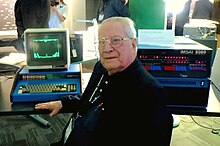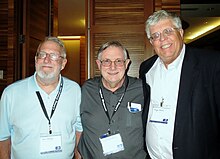Homebrew Computer Club
The Homebrew Computer Club in Silicon Valley, was one of the earliest and most influential computer clubs in the world. The club met from March 5, 1975, to December 1986. Several prominent businessmen and hackers emerged from the club, including the founders of Apple and Cromemco. The club has been described as "the melting pot of an entire industry".
History
The Homebrew Computer Club was an informal group of electronics enthusiasts and technically inclined hobbyists who collected and exchanged parts, circuits, and information regarding the DIY construction of computing devices. It was started by Gordon French and Fred Moore who met at the Community Computer Center in Menlo Park. Both were interested in maintaining a regular open forum for people to come together to work on making computer manufacturing more accessible to everyone. The first meeting was held in March 1975 in Gordon French's garage in Menlo Park., San Mateo County, California, on the occasion of the arrival in the area of the first Altair microcomputer, a unit sent by the People's Computer Company for review. Subsequent meetings were held at the Stanford Linear Accelerator Center.
After more or less "formal"meetings, the participants would often reconvene at "The Oasis," a bar and grill on El Camino Real near Menlo Park, remembered years later by one member as "another Homebrew waiting area".
The 1999 made-for-TV movie Pirates of Silicon Valley (and the book on which it is based, Fire in the Valley: The Making of the Personal Computer) it describes the role the Homebrew Computer Club played in creating the first personal computers, although the film misplaced the meeting in Berkeley and misrepresented the meeting process.
Many of the original members of the Homebrew Computer Club continue to meet (as of 2009) having formed the 6800 Club, a name based on the Motorola (now Freescale) 6800 microprocessor. Occasionally and variously renamed after the release of the 6800, 6809, and other microprocessors, the group continues to meet monthly in Cupertino, California.
Members
Although Homebrew members were hobbyists, most had a background in electronic engineering or computer programming. They came to the meetings to discuss the Altair 8800 and other technical topics and exchange schematic diagrams and programming tricks.
Lee Felsenstein was the moderator of the club meetings (bearer of "the great rod," a blackboard indicator used as a prop for his form of moderation). From the ranks of this club came the founders of many microcomputer companies, including Steve Wozniak (Apple Inc), Harry Garland and Roger Melen (Cromemco), George Morrow (Morrow Designs), Adam Osborne (Osborne Computer), and Bob Marsh (Processor Technology).
John Draper (of “Captain Crunch” fame) was also a member of the club, as was Li-Chen Wang, creator of “Palo Alto Tiny Basic” and software for the Cromemco Dazzler. Jerry Lawson, inventor of the first system cartridge-based video game club was a member of the club, and was the only African-American member.
Newsletter
The Homebrew Computer Club newsletter was one of the most influential forces shaping Silicon Valley culture. Created and edited by its members, it started the idea of the personal computer, and helped its members build the original computer kits, such as the Altair 8800 that debuted in Popular Electronics magazine. One such influential event was the publication of Bill Gates' Open Letter to Hobbyists, which blasted early hackers of the day for hacking commercial software.
The first newsletter application was published on March 15, 1975, and it continued in various designs, ending after 21 issues in December 1977. In its early days, the newsletter was published from a variety of directions, but subsequent submissions went to a P.O.Box address in Mountain View, California.
Club reunions
There have been two reunions of the club: on March 5, 2001 and on November 11, 2013.
The first reunion of the club, which was held in 2001, took place in the auditorium of the Stanford Linear Accelerator Center (SLAC), the same place where the club met historically. Many early club members attended the reunion including Gordon French (host of first club meeting), Len Shustek (host of SLAC meetings), Lee Felsenstein (chair of club meetings), Harry Garland and Roger Melen (co-founders of Cromemco), and John Draper (“Captain Crunch”).
The club's second reunion was held on November 11, 2013 at the Computer History Museum in Mountain View, California. The reunion was arranged by Hilda Sendyk, a member of the club. Len Shustek, president of the museum, was the host. Because of the great importance of the club in the development of personal computer technology, many representatives of the press attended the event including Time Magazine, Bloomberg News, and the New York Times. Lee Felsenstein moderated the meeting, and Ted Nelson (author of the book "Computer Lib") and Steve Wozniak (co-founder of Apple Computer) were the speakers.
Contenido relacionado
Ethnography of Spain
Guzman the Good
Nineteen ninety six



